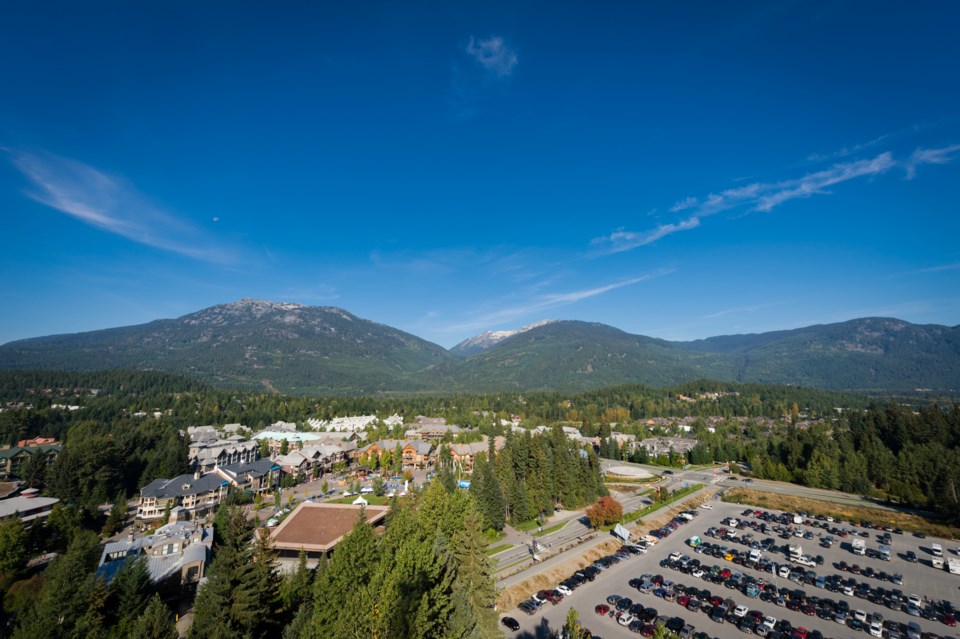Whistler Blackcomb (WB) will trial a carpooling incentive program this ski season it says is designed to reduce congestion and improve parking issues during peak periods.
“Road congestion and parking challenges in Whistler and along the Sea to Sky corridor have long been important issues in our community,” read a statement from WB provided to Pique on Tuesday, Oct. 8. “Whistler Blackcomb is committed to a collaborative, solutions-oriented approach to improving the experience of residents and guests travelling to and within the resort.”
In effect on weekends, statutory holidays (excluding Christmas Day), and peak periods from 6 to 11 a.m., vehicles with four or more occupants will be given priority parking access in P1 at the Creekside garage and in Upper Lot 7 at Blackcomb Base II.
After 11 a.m., these lots will open to all vehicles, regardless of the number of occupants. “It’s important to note parking in both lots remains free at all times without the need for reservations,” said Belinda Trembath, COO of Whistler Blackcomb, in an Oct. 8 presentation to mayor and council.
WB noted it reserved the trial program for peak days instead of, say, weekdays, to address higher demand. A spokesperson explained the company would “consider in-season modifications where it makes sense and based on results and feedback.”
Asked how WB would enforce the four-occupant threshold, the spokesperson said its parking team will “monitor access to ensure those vehicles that qualify are granted access during the allotted times.”
The incentive program is already in place at other Vail Resorts properties in North America, and has proven effective, according to the Colorado-based company that counts WB among its portfolio of 42 ski resorts.
At both Heavenly and Northstar in California, the company said carpooling was “highly utilized” after implementation last ski season. Of the reservations available in lots with the carpool incentive, Vail Resorts said 65 per cent of guests at Heavenly and 62 per cent at Northstar took advantage of the free parking. It also reported guest satisfaction with the arrivals and parking experience rose 16 per cent at Heavenly, and 14 per cent at Northstar. Perhaps most importantly for Whistlerites who voiced concerns with parking congestion and delays last winter, Vail Resorts said there was a 60-per-cent reduction in the frequency and severity of travel time delays at Heavenly’s base area, and a 48-per-cent reduction at Northstar in January and February, two of those resorts’ busiest months.
“Early observations suggest that occupants per vehicle are low,” Trembath said of Whistler. “The opportunity to trial carpooling, which has been a success at our other North American resorts, will assist to further inform the study as it pertains to changing guest behaviour.”
Trembath is referring to a yearlong parking study that was one of four conditions attached to the Whistler council’s approval, last year, of WB’s Fitzsimmons Express upgrade. The results of the study must be shared with the municipality to improve the understanding of parking utilization in the resort, quantify how parking is being used, and develop a database to inform the design of future solutions.
“We will use insights to guide future initiatives for optimal community and visitor outcomes,” Trembath said. “We’re committed to being solutions-oriented. This means continuously looking at our own processes, policies and traffic patterns, analyzing our own parking capacity and constraints, while also working alongside the community and our resort partners through ongoing communication, collaboration and innovation.”
The new eight-pack chairlift opened for use in December.
The Fitzsimmons Express upgrades were not without controversy when they were greenlit by resort officials in March 2023. At two hastily organized special meetings held within the same week, mayor and council adopted a suite of bylaw amendments and a development permit that paved the way for the chairlift improvements without the usual requirement to provide additional parking. Increasing capacity from 1,850 to 3,300 skiers per hour, under normal conditions, Vail Resorts would have been required to install an additional 725 parking spaces.
The company also had to be reminded by the municipality a permit was required four months after the project was announced. “It was a step missed on Whistler Blackcomb’s end of things,” Resort Municipality of Whistler (RMOW) CAO Ginny Cullen said last March.
RMOW staff at the time said they rushed the development permit due to the benefits of a lift project that massively improved loading capacity. Staff also pointed to the benefit of keeping vehicles off the road, a key tenet of its Big Moves strategy, by not adding hundreds of new parking spots.
In lieu of new parking, another condition set upon Vail Resorts requires the company to pay the RMOW $200,000 annually, about $275 per parking spot, until it introduces pay parking in the lots it owns. If it does go this route, Vail Resorts must also share parking revenue with the RMOW that will fund transit and active transportation improvements.
While Vail Resorts has not announced any plans to implement pay parking on its local lots, it has done so at several of its U.S. resorts, including Heavenly and Northstar, where the carpool program was launched last ski season.
Visit Whistler Blackcomb’s FAQ page for more info on the carpool program.




